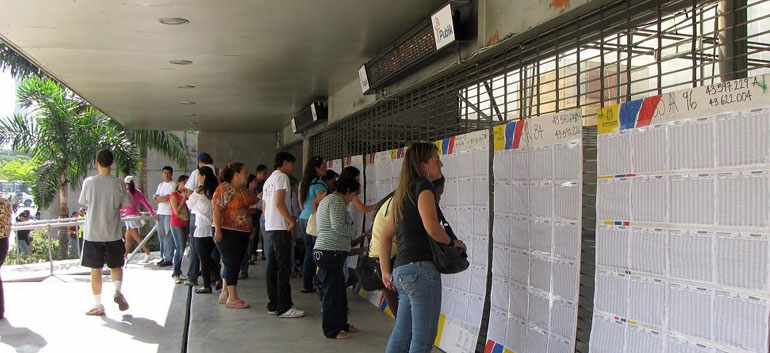Colombia’s government must “carefully monitor” upcoming 2014 elections in order to avoid violence, coercion, and corruption, and “to mitigate irregularities” in the electoral process according to the director of an electoral observation NGO.
The Electoral Observation Mission (MOE) released 22 recommendations to the public Thursday afternoon during a press conference in the wake of President Juan Manuel Santos’ announced hopes for reelection Wednesday evening.
“Yesterday…our 37 regional offices came together and made an analysis of context and territory that faces the [2014] electoral process and we punctually came to 22 recommendations that have the objective of mitigating possible irregularities to the electoral process next year–both for the congressional elections [in March] and the Presidential elections [in May],” MOE Director Alejandra Barrios told Colombia Reports.
These 22 recommendations, which aim to combat a historically flawed election system in Colombia, were discussed with and then officially presented today to the Ministry of the Interior for further dialogues and hopeful implementation.
“Today we have been discussing each one of these recommendations with the Minister of the Interior,” Barrios continued. “there are recommendations targeted at the Inspector General’s office, others at the National Registry, and others at the National Electoral Council (CNE).”
The CNE was designed in Colombia’s 1991 reformed constitution to be in charge of the inspection, supreme vigilance and organization of Colombia’s elections. However with a website that is barely functional and a election system that has a history of having problems, the CNE welcomes help from civilian watchdog groups such as MOE. Though ultimately, MOE’s director explained, the Ministry of the Interior has the final word.
“There are different actors to which we are directing the recommendations, but the Ministry of Interior is in charge of bringing together the national electoral commission. The [Ministry of the Interior] has the maximum authority over the upcoming elections,” elaborated Barrios.
The leader of the NGO expressed that already, their recommendations were being viewed favorably by the government.
“Already they were eager to adopt some measures, and others they are going to bring to the table to discuss with the elections commission,” said Barrios.
The recommendations were broken up into three large categories: Irregularities and the Quality of the Electoral Process; Public Order; and Institutional Mandates to the Electoral Process.
Concerning irregularities and the quality of the electoral process, MOE’s director expressed the intended goal of this category is to “strengthen the electoral process.”
The primary points in this first group include assuring that local politicians do not use public programs to influence elections; signing and tracking the individual ballots so that none are unaccounted for; establishing a regulated procedure for Colombians living abroad to have their vote count; confirming that all candidates have balanced access to media outlets in accordance with the law; and monitoring the finances of campaigns to ensure that parties are not receiving money from illegal or unfair sources.
This first group of recommendations makes up nine of the 22 proposals.
Concerning public order, Barrios expressed that this theme “really worries us” because it has the real potential to influence voters and the outcomes of elections.
These five recommendations make reference to vigilantly enforcing the law when it comes to an ongoing emerald-based conflict in central Colombia, alliances with illegal armed groups, a prevalence of criminal gangs and mafia gangs, land restitution disputes, and urban violence.
The MOE director emphasized that all of these situations pose risks to the electoral process and furthermore identified “16 municipalities that we consider should have a special vigilance by the authorities.”
Finally, the third category of institutional mandates for the electoral process, comprised of eight total recommendations, examines tangible implementable procedural ideas for improving the status quo of elections moving forward. This includes forming a special unit for electoral crimes headquartered in the Prosecutor General’s office; creating commissions on the state and municipality level dedicated to the monitoring and guaranteeing of safety for all parties involved in elections; utilizing biometrics to identify voters and prevent instances of voter fraud; and making as much information about elections transparent as possible.
Barrios concluded saying that she hopes that these recommendations are taken seriously and implemented by the government if Colombia wishes to have a secure and safe election season in the first half of 2014.
Sources
- MOE Press Release (MOE)
- Interview with Alejandra Barrios


